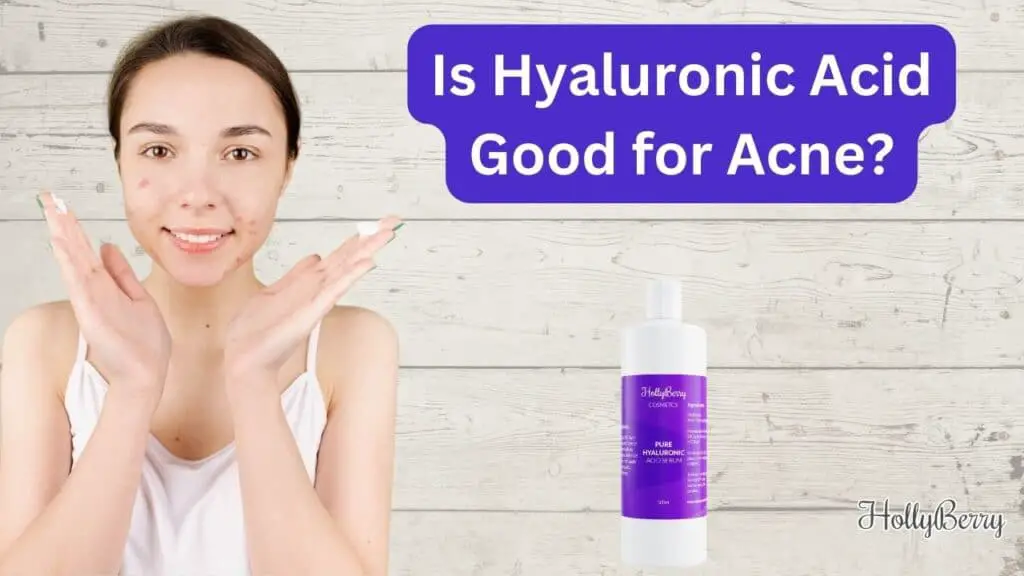
Acne is a common skin condition that affects millions of people around the world. It can be caused by a variety of factors, including hormonal changes, genetics, and diet.
While there are many treatments available for acne, some people are turning to hyaluronic acid as a natural alternative. But is hyaluronic acid actually effective for treating acne?
Hyaluronic acid is a naturally-occurring substance that is found in the body. It is known for its ability to hydrate and plump the skin, making it a popular ingredient in skincare products. But can it also help with acne?
The short answer is yes, hyaluronic acid can be beneficial for acne-prone skin. Here’s why:
Hyaluronic acid hydrates the Skin
One of the main causes of acne is dry skin. When the skin is dry, it can become irritated and inflamed, which can lead to breakouts. Hyaluronic acid is a powerful hydrator that can help to keep the skin moisturized, reducing the likelihood of acne. Order our hyaluronic acid here.
H A serum reduces Inflammation
Acne is an inflammatory condition, and reducing inflammation is key to treating it. Hyaluronic acid has anti-inflammatory properties that can help to calm irritated skin and reduce redness and puffiness.
It also exfoliates the Skin
Exfoliating the skin can help to remove dead skin cells and unclog pores, reducing the likelihood of breakouts. Hyaluronic acid is gentle enough to be used as an exfoliant, helping to clear away excess oils and dirt that can contribute to acne.
Boosts Collagen Production
Collagen is a protein that helps to keep the skin firm and elastic. As we age, our bodies produce less collagen, which can lead to wrinkles and sagging skin. Hyaluronic acid can help to boost collagen production, which can help to improve the overall appearance of the skin.
So, is hyaluronic acid good for acne? The answer is yes. Hyaluronic acid is a powerful skincare ingredient that can help to hydrate, reduce inflammation, exfoliate, and boost collagen production, all of which can help to reduce the likelihood of breakouts.
However, it’s important to note that hyaluronic acid should be used in conjunction with other acne-fighting ingredients, such as salicylic acid and benzoyl peroxide, for optimal results.
In conclusion, hyaluronic acid is a great addition to any skincare routine, especially for those with acne-prone skin. It can help to hydrate, reduce inflammation, exfoliate, and boost collagen production, all of which can help to reduce the likelihood of breakouts.
If you’re looking for a natural alternative to traditional acne treatments, consider incorporating hyaluronic acid into your skincare routine.
Alternatives to Hyaluronic Acid for Acne Treatment
If you’re looking for alternative options to treat acne, there are several options available. Here are a few that you can consider trying:
1 – Salicylic acid: This is a type of beta hydroxy acid that can help unclog pores and reduce inflammation. It’s often found in over-the-counter acne products.
2 – Benzoyl peroxide: This is another common ingredient in over-the-counter acne products. It works by killing the bacteria that can cause acne.
3 – Retinoids: These are derivatives of vitamin A and can be found in prescription topical creams and gels. They work by increasing cell turnover and helping to unclog pores.
4 – Tea tree oil: This essential oil has antibacterial properties and can help reduce inflammation. It can be found in many over-the-counter products.
5 – Sulfur: This is a mineral that can help reduce inflammation and unclog pores. It’s often found in over-the-counter acne products in the form of sulfur soap, lotions, and masks.
It’s important to note that everyone’s skin is different, so what works for one person may not work for another. It’s always best to consult a dermatologist to find the best treatment for you.
FAQ for – Is Hyaluronic Acid Good for Acne
What is hyaluronic acid?
Hyaluronic acid is a naturally-occurring substance that is found in the body. It is known for its ability to hydrate and plump the skin, making it a popular ingredient in skincare products.
What are the benefits of hyaluronic acid for acne-prone skin?
Hyaluronic acid can hydrate the skin, reduce inflammation, exfoliate the skin, and boost collagen production, all of which can help to reduce the likelihood of breakouts.
Can hyaluronic acid be used as an alternative treatment for acne?
Yes, hyaluronic acid can be used as a natural alternative treatment for acne. It can help to hydrate, reduce inflammation, exfoliate, and boost collagen production, all of which can help to reduce the likelihood of breakouts.
Is it safe to use hyaluronic acid on the skin?
Yes, it is generally considered safe to use hyaluronic acid on the skin. However, it’s always best to do a patch test first to ensure that you are not allergic to the product.
Can hyaluronic acid be used alone to treat acne?
While hyaluronic acid can be beneficial for acne-prone skin, it is best used in conjunction with other acne-fighting ingredients, such as salicylic acid and benzoyl peroxide, for optimal results.


